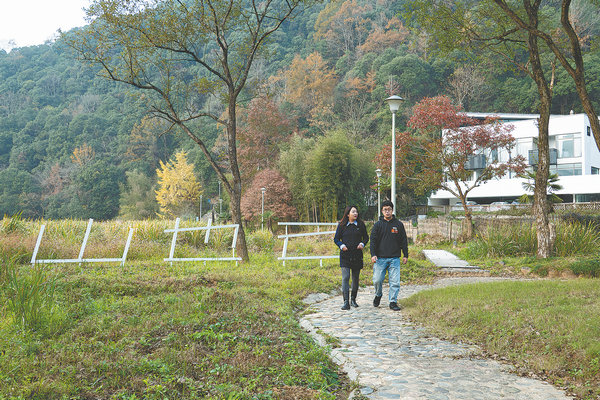

At 15, Guo Shanqiuyun made a bold decision to attend middle school in the United States, and eight years later, made an even bolder decision to return to China and start her career in the countryside.
Unlike her parents' generation, which aspired to move to cities or go abroad, Guo and her husband chose to pursue their dreams in picturesque Tangjiazhuang village in Huangshan city, Anhui province.
"We believe that there are more opportunities in rural areas," says 33-year-old Guo, who is now honorary village head. "We would like to explore them."
Guo is among an increasing number of young Chinese, who have returned from overseas after their studies to pursue their dreams.
According to the "2022 Blue Paper for Chinese Overseas Students Returning to China for Employment" released by the Chinese Service Center for Scholarly Exchange, the number of students returning to China has significantly grown since 2012, with about 3.4 million having returned, or more than 80 percent of the people who have studied abroad.
Guo studied business at Bentley University in the US before pursuing Asian arts at the Sotheby's Institute of Art, while her husband worked as an architect. The trajectory of her life changed after a trip to Tangjiazhuang with her father at the end of 2014.
"It was like a sheet of blank paper," she says of the small village, which is set in beautiful surroundings.
She soon had the idea to turn the village into a multifunctional hub with food, entertainment and accommodation options, with the goal of attracting investment and tourists while improving the lives of villagers. The couple swung into action and began by transforming old houses into cafes and homestays.
After sustaining double-digit growth for five consecutive years, the village's collective income rose to 897,000 yuan ($122,357) in 2023. Last year, the village welcomed over 30,000 visitors, a 30 percent increase on the previous year.
Like Guo, Zhan Xiuchen also returned to his hometown after studying abroad. The 26-year-old Nanjing native with a master's degree in finance from the Australian National University is now pursuing his doctorate at the China Pharmaceutical University.
"During my five years in Australia, I experienced the COVID-19 pandemic," Zhan says. "While I saw the advantages of China's system in controlling the spread of the disease, I also realized that there is room for improvement concerning vaccines and innovative drugs."
As a result, he decided to return to work in the field of pharmacoeconomics to help people access the most cost-effective medicines.
Speaking more about his decision to leave Australia, Zhan cites his desire to be closer to his parents.
"I didn't notice much difference between everyday life in Australia and China," he says, adding that China has been rapidly catching up to developed countries in recent years, with the environment and infrastructure in major cities improving quickly.
A 2018 Ipsos survey conducted in 15 countries found that Chinese people are the most optimistic about the future. According to the survey, 84 percent of adults and 92 percent of teenagers in China believe their lives would be better than those of their parents, compared to 51 percent and 47 percent in Britain, 37 percent and 31 percent in France, 46 percent and 52 percent in the United States, and 50 percent and 53 percent in Australia.
Zhan notes that compared to his parents, he lives at a time when China is on the fast track of development.
Li Qin, a professor at the School of Journalism and Communication at the Renmin University of China, believes that the middle-aged generation that grew up at a time when China was less developed used to regard Western countries as representatives of high-end living, whereas their children tend to look at the world on an equal footing.
According to a 2021 Global Times survey of 1,281 people aged 15 to 35 across China, the proportion of those who view Western countries as equals increased by 6 percentage points over the past five years, while the percentage of those who look up to the West dropped from 37.2 to 8.1.
Guo acknowledges the benefits of education in Western countries, where cultural, sports, and scientific activities help develop students' skills and leadership. However, she finds that life in China offers greater safety and more efficient daily conveniences.